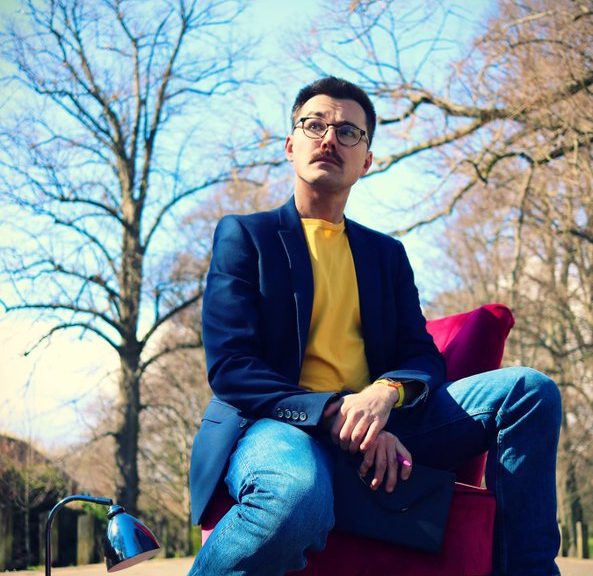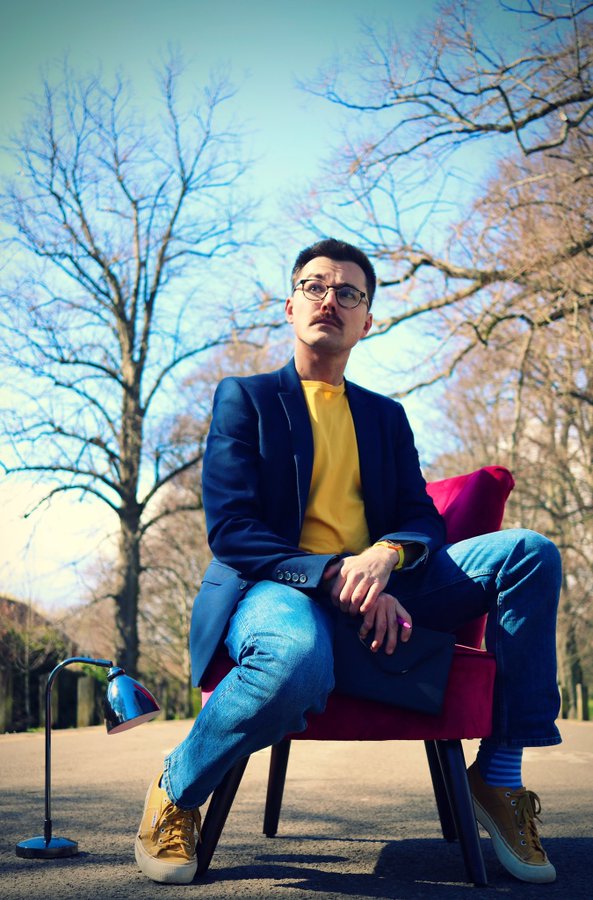
Hi Chris, great to meet you, can you give our readers some background information on yourself please?
Shwmae! I am a writer. I was born in Abergavenny, raised in Ebbw Vale, and then Cwmbrân, and now living in Bridgend with my fiancé. I had a Welsh language education in Pontypool (and now I predominately identify as a Welsh language theatre maker). I studied my BA in Drama at Aberystwyth University, and my MA in International Dramaturgy at the University of Amsterdam. I’ve been writing for theatre for about 10 years now, having had many fantastic opportunities to exercise and explore new work. I’ve been fortunate to work with Theatr Bara Caws, Theatr Genedlaethol Cymru, Theatr Iolo, Theatrau Sir Gar, National Theatre Wales, Dutch National Opera, Ensemble Modern, Cwmni Theatr Frân Wen and Cwmni Theatr Arad Goch. I’ve also worked in a pharmacy, as a teaching assistant and a drama club facilitator. It’s all relative!
So, what got you interested in the arts?
I have my parents to thank for that. Neither of them work in the arts, but they regularly took my sister and I to the theatre from a very young age. The stating point was likely seeing ‘Budgie the Little Helicopter’ at the New Theatre, Cardiff. They also took us to Kids Week in London (a brilliant initiative) during the summer, all the way up until we were 16. They always encouraged broad-mindedness in any art form we watched. We went to all sorts of theatre across the country, as well as the cinema, museums, art galleries, as well as the weekly movie nights we would have at home.
Why do you write?
I see the world in a very creative way. Ideas come to me all the time from all corners of life. Human behaviour and experience is theatrical. I have too many ideas. Writing is a method in which to make sense of things. News bulletins and anecdotes and shared-experiences and reading historical documents translate into creative artforms that I visualise. To me, everything has creative potential. I can’t always deal with things ‘just’ as they are, or as matter of fact. I like to imagine and interpret all the time, and ask – ‘why are things like that?’
Can you tell us about your writing process? Where do your ideas come from?
Anywhere. And new ideas usually catch you off-guard! There’s been many a situation where I have had to say: ‘Stop a minute, I have to write this down!’. From there, it’s usually many weeks of toying, thinking, contemplating, researching. If the idea disappears after 6 weeks, then I can’t love it that much to begin immediately. I don’t always start with ‘something to say’. That usually comes later. If I have an idea, and later on it begins to resonate with my own personal opinions, experiences or perspective on things (or challenges them) – and the idea sits with me long enough (I get bored quite easily too) – then I know I may have something. I also thrive on collaboration. I like to work with a director very early on to really uncover a play.
Can you describe your writing day? Do you have a process or a minimum word count?
I personally don’t think there’s such a thing as a writing day because, every time I sit down to ‘write’, I usually scroll on Twitter or stare blankly somewhere. You have to let the ideas come to you. Sometimes they come in chronologically, order sometimes in a random order. The ‘process’ is trusting that it is a process that requires time. I also think it’s healthy to have a different approach and process with each new play. Let the work dictate to you what it needs. I recently completed the first draft of a new play entirely by hand in a notebook because I wanted to try not writing any of it at home and to make the process more mobile. Now I have to find time to type it up . . .
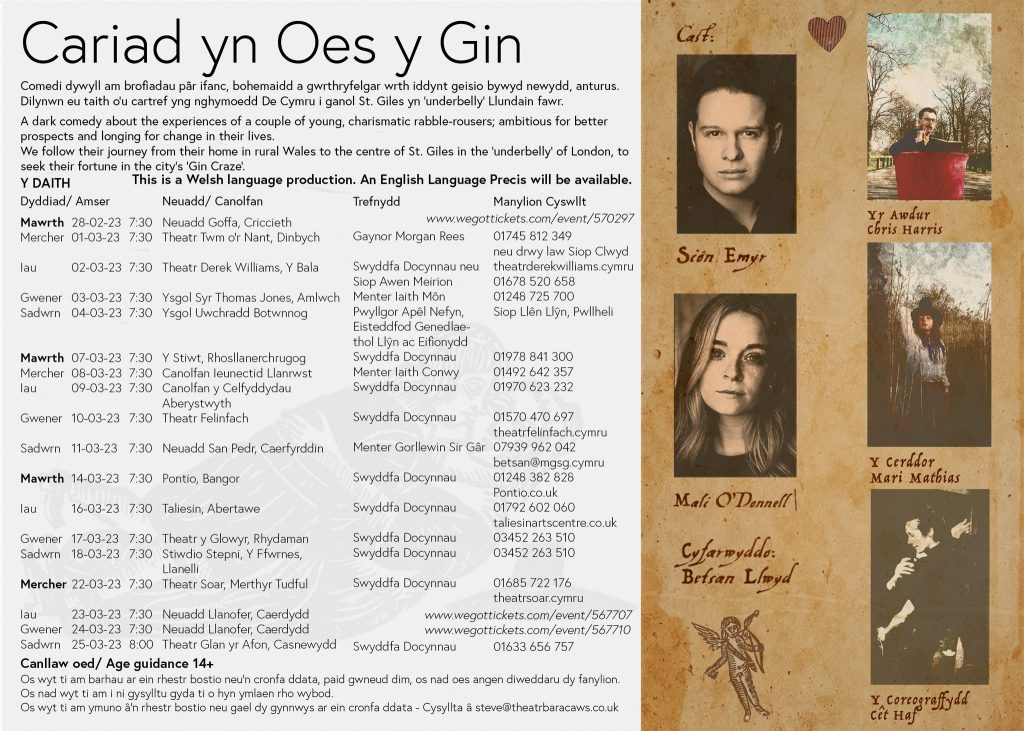
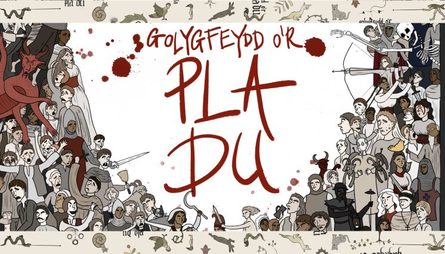
This spring you have two new Welsh Language productions on tour, Cariad yn Oes y Gin produced by Theatr Bara Caws which is described as “A dark comedy about the experiences of a young, bohemian and rebellious couple as they seek a new, adventurous life.” And Golygfeydd o’r Pla Du, a Theatrau Sir Gâr Production, supported by Theatr Genedlaethol Cymru which is described as “A mischievous, black (death) comedy about crisis and corruption, packed with scandal, songs, singing goats and horse sh*t. Welcome to the Black Death – there’s nothing funnier.”
There is clearly a theme of dark comedy in your work! What inspired both productions and what are your ambitions for the tours?
‘Cariad yn Oes y Gin’ was inspired by asking how something so destructive, like gin, was discovered for the first time. I was interested in how, in 1736, it affected people on a societal level, and how a bridge once build between the lower and upper classes was suddenly eradicated because of gentrification. I also wanted to see it through the lens of a young, care-free (and rather naive couple) who get a big slice of reality when paving their own way through life.
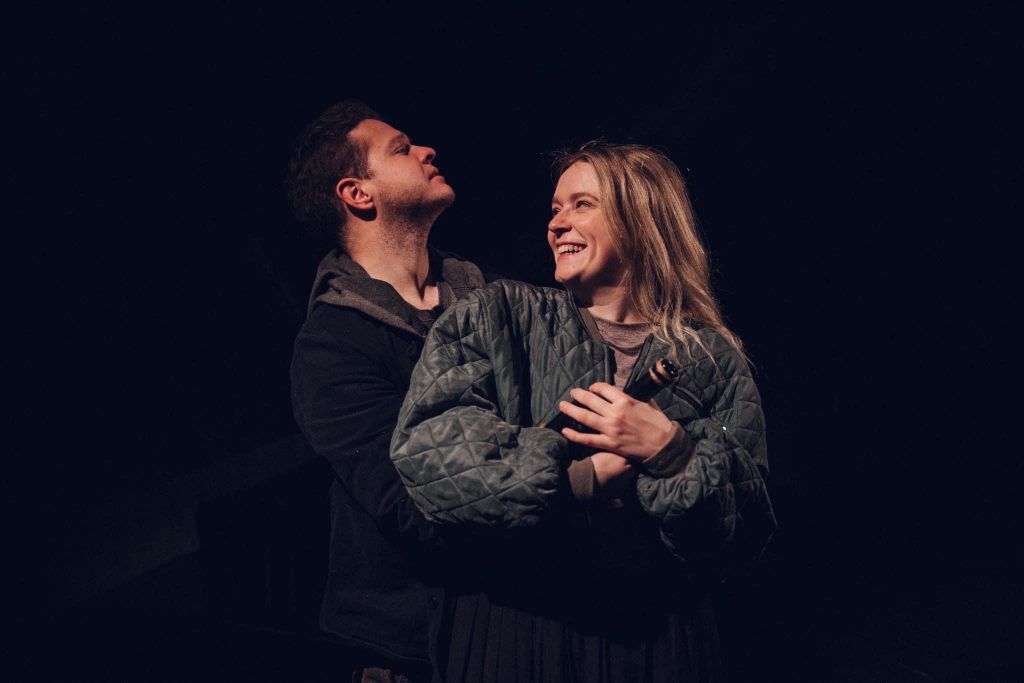
I’ve thought a lot about the nature of love and relationships over the past couple of years, and how one must adapt and, sometimes, compromise in a true relationship, whilst also holding on to their very true selves. Gin, a new and destructive drink in society, becomes a symbol of freedom and power for this young, rabble-rousing couple.
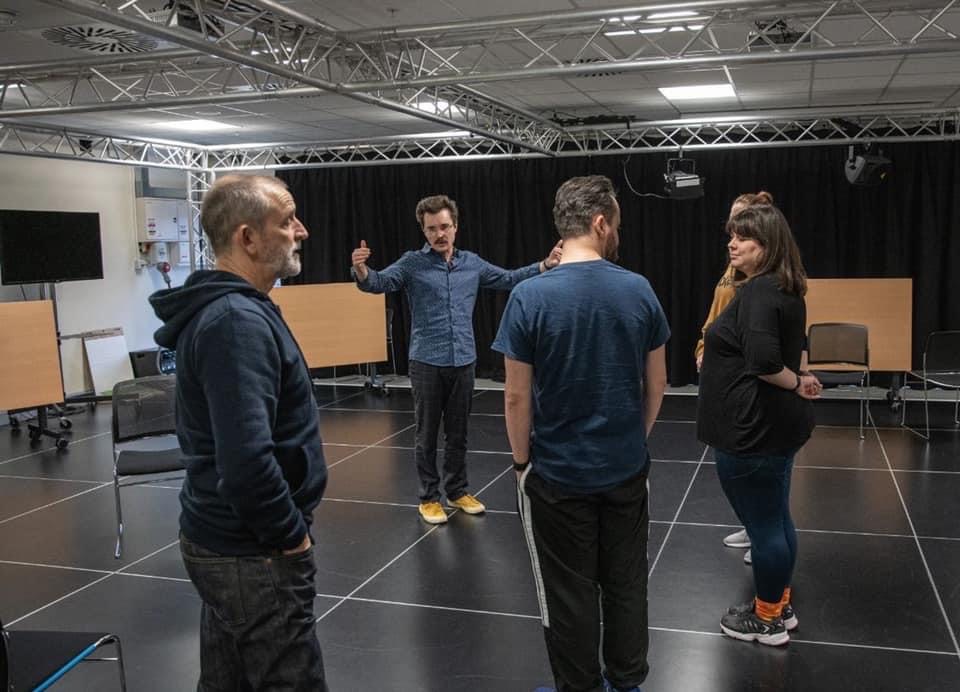
‘Golygfeydd o’r Pla Du’ began life as wanting to be popcorn-theatre for Welsh language audiences in the vain of some of my heroes: Mel Brooks, Monty Python and The League of Gentleman. It’s written for 4 actors sharing around 35 characters. It’s fast, it’s polymathic and outrageous. Of course, like all theatre work, it quickly evolved into something more than just a satirical comedy, and I began to see how crisis, such as a pandemic, brings out the true nature of people. It seems there are many out there who benefited from the COVID-19 pandemic, and the play aims to make an acknowledgment of that through satire.
Both productions take place in an historical context. Do you think the plays period and themes will resonate with contemporary audiences?
I think so. I find it easier to contemplate what is going around us in the present through a historical lens. There’s a sense that enough time has settled for us to learn from history and to see things exactly as they are through the ‘then’. The ‘Gin Craze’ saw many people’s freedoms being curbed, not just on the basis that the drink was doing so much harm to people, but the working classes were entirely to blame for the increase in violence. You’d be surprised at how much corruption and scandal became evident as a result of the Black Death. People began to see the cracks in their leadership and in the feudal system. The ‘Peasant’s Revolt’ came shortly after that. It wasn’t all ‘Partygate’ or how much of public funding was spent on a private jet flight of 30 minutes, but the gesture of abuses of power was very much the same. Through history, we see lessons that have never been learnt.
There are a range of organisations supporting Wales based writers. I wonder if you feel the current support network and career opportunities feel ‘healthy’ to you? Is it possible to sustain a career as a writer in Wales and if not, what would help?
Yes, it certainly feels healthy. I was very fortunate to be invited to a few of those schemes myself (particularly the Sherman Theatre’s schemes in 2016 – 2018 curated by Philip and Christine Carne, Brad Birch, Gethin Evans and David Mercatali). My worry is that there still aren’t schemes to commit to writers long-term – to take risks. Theatr Bara Caws, Theatrau Sir Gar, Theatr Iolo, Blackwood Miners Institute . . . they’ve all taken a risk on me by following through. It takes time, but I don’t know a single aspiring/emerging writer who wouldn’t want to take that time if it meant the end-goal was getting their work seen and discussed by a paying audience.
Is it sustainable being a writer? No, not really. But I recommend training and taking work in other aspects of the arts, if possible: box office, outreach, education, administration, technical . . . whatever. It all feeds into your understanding of the working mechanism that makes up an arts organisation and gives you a greater appreciation of it. However, never work for free.
If you were able to fund an area of the arts what would this be and why?
Access. It’s a financial barrier for many companies, and the costs are increasing for everything. A ‘Dream Scheme’ would be to see core arts organisations given additional resources and funding to ensure that all aspects of access can be addressed: in-house software for captioning, cheaper/free hire of captioning software (Theatr Gen’s access app Sibrwd is super-easy, for example)
More funding to ensure BSL interpreters/Audio describers are given more performances and more preparation time, access costs being subsidies by larger funding bodies (but not necessarily included in core production budgets) and that wide-spread training is free, accessible and continuous.
What currently inspires you about the arts in Wales?
An identity that has shifted from that of coal miners and choirs and drowned villages to telling the real, contemporary stories of the diverse people of Wales. Also, our awakened sense of nationhood sat in the context of the British Empire. I’ve seen a lot of Welsh language work in the past few years that touches on this in an exciting way. To put all that into context, I went to see ‘The Corn is Green’ by Emlyn Williams at the National Theatre last year. Without going on about it, there’s a reason why that play ISN’T being performed in Wales and HASN’T for a very long time.
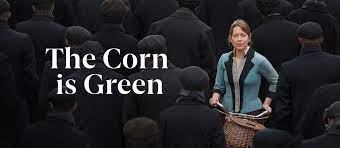
What was the last really great thing that you experienced that you would like to share with our readers?
Oh, I went to see Damien Chazelle’s new film ‘Babylon’ recently!
In it, I saw two of my favourite films slammed together in an orgiastic, unapologetic party: ‘Singin’ in the Rain’ meeting ‘The Wolf of Wall Street’. It actually made me think a little about ‘Cariad yn Oes y Gin’ (I love it when that happens – you’re nervous about an idea you’ve thought of, and then see someone else execute it in a different context, making you confident that your idea will work!). For all the drug-fuelled, addicted splendour that ‘Wolf’ and ‘Babylon’ brought, the party has to die down eventually, because people get hurt. That’s what we see in Dylan and Nansi’s journey in ‘Gin’.
Thanks for your time
Croeso, wir!

